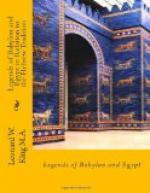If the above line of reasoning be sound, it follows that, while the earlier Hebrew Version closely resembles the Gilgamesh Epic, the later Hebrew Version, by its omission of the birds, would offer a parallel to the Sumerian Version. But whether we may draw any conclusion from this apparent grouping of our authorities will be best dealt with when we have concluded our survey of the new evidence.
As we have seen, the text of the Fifth Column breaks off with Ziusudu’s sacrifice to the Sun-god, after he had opened a light-hole in the boat and had seen by the god’s beams that the storm was over. The missing portion of the Fifth Column must have included at least some account of the abatement of the waters, the stranding of the boat, and the manner in which Anu and Enlil became apprised of Ziusudu’s escape, and consequently of the failure of their intention to annihilate mankind. For in the Sixth Column of the text we find these two deities reconciled to Ziusudu and bestowing immortality upon him, as Enlil bestows immortality upon Ut-napishtim at the close of the Semitic Version. In the latter account, after the vessel had grounded on Mount Nisir and Ut-napishtim had tested the abatement of the waters by means of the birds, he brings all out from the ship and offers his libation and sacrifice upon the mountain, heaping up reed, cedar-wood, and myrtle beneath his seven sacrificial vessels. And it was by this act on his part that the gods first had knowledge of his escape. For they smelt the sweet savour of the sacrifice, and “gathered like flies over the sacrificer".(1)
(1) Gilg. Epic, XI, l. 162.
It is possible in our text that Ziusudu’s sacrifice in the boat was also the means by which the gods became acquainted with his survival; and it seems obvious that the Sun-god, to whom it was offered, should have continued to play some part in the narrative, perhaps by assisting Ziusudu in propitiating Anu and Enlil. In the Semitic-Babylonian Version, the first deity to approach the sacrifice is Belit-ili or Ishtar, who is indignant with Enlil for what he has done. When Enlil himself approaches and sees the ship he is filled with anger against the gods, and, asking who has escaped, exclaims that no man must live in the destruction. Thereupon Ninib accuses Ea,




